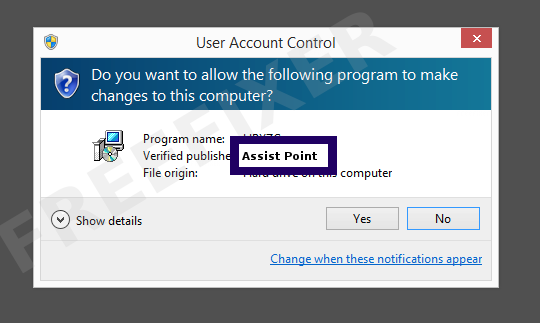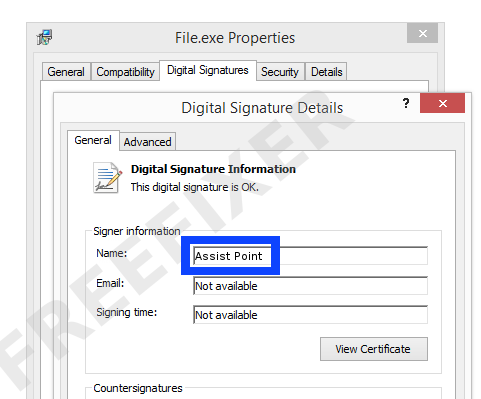Assist Point - 33% Detection Rate *
Did you just find a download or a file on your computer that is digitally signed by Assist Point? Some of the security products refers to the detected files as Trojan.Yontoo.1781 and W32.HfsAdware.D77F. The detection rate for the Assist Point files collected here is 33%. Please read on for more details.
You'll probably see Assist Point when running the file. The publisher name is then displayed as the "Verified publisher" in the UAC dialog as the screencap shows:

You can also view the Assist Point certificate with the following steps:
- Open up Windows Explorer and locate the Assist Point file
- Right-click the file and select Properties
- Click on the Digital Signatures tab
- Click the View Certificate button
Here is a screencap of a file signed by Assist Point:

As you can see in the screengrab above, Windows states that "This digital signature is OK". This means that the file has been published by Assist Point and that no one has tampered with the file.
If you click the View Certificate button shown in the screengrab above, you can examine all the details of the certificate, such as when it was issued, who issued the certificate, how long it is valid, etc. You can also examine the address for Assist Point, such as the street name, city and country.
VeriSign Class 3 Code Signing 2010 CA has issued the Assist Point certificates. You can also view the details of the issuer by clicking the View Certificate button shown in the screengrab above.
Assist Point Files
These are the Assist Point files I have gathered, thanks to the FreeFixer users.
| Detection Ratio | File Name |
|---|---|
| 8/57 | 665D1B77_stp.EXE |
| 24/57 | dc727a8c-7582-483c-a1c2-2b885f099bb5.dll |
| 13/57 | plugincontainer.exe |
| 17/56 | Plugin.exe |
| 12/56 | Plugin.exe |
| 12/57 | updater.exe |
| 44/57 | dc727a8c-7582-483c-a1c2-2b885f099bb5.dll |
Scanner and Detection Names
Here is the detection names for the Assist Point files. I have grouped the detection names by each scanner engine. Thanks to VirusTotal for the scan results.
| Scanner | Detection Names |
|---|---|
| ALYac | Adware.BrowseFox.EK |
| AVG | BrowseFox.7B4, AdPlugin.DTP |
| AVware | Trojan.Win32.Generic!BT, Yontoo |
| Ad-Aware | Adware.BrowseFox.EK |
| AegisLab | Adware.Browsefox.Gen!c |
| AhnLab-V3 | PUP/Win32.BrowseFox |
| Antiy-AVL | Trojan/Win32.TSGeneric, GrayWare[AdWare:not-a-virus]/Win32.Agent |
| Arcabit | PUP.Adware.BrowseFox |
| Avast | Win32:BrowseFox-JN [PUP] |
| Avira | ADWARE/BrowseFox.Gen7, ADWARE/BrowseFox.Gen |
| Baidu | Win32.Adware.BrowseFox.c |
| Baidu-International | Adware.Win32.BrowseFox.AQ |
| BitDefender | Adware.BrowseFox.EK |
| Bkav | W32.HfsAdware.D77F |
| CAT-QuickHeal | PUA.Assistpoin.Gen |
| ClamAV | Win.Adware.Browsefox-725, Heuristics.Trojan.Swizzor.Gen |
| Cyren | W32/S-9cde2735!Eldorado, W32/S-d5ab916c!Eldorado, W32/S-c8a99981!Eldorado, W32/S-a360f769!Eldorado |
| DrWeb | Trojan.Yontoo.1781 |
| ESET-NOD32 | a variant of Win32/BrowseFox.BA potentially unwanted, a variant of Win32/BrowseFox.AU potentially unwanted, a variant of Win32/BrowseFox.BT potentially unwanted, a variant of Win32/BrowseFox.AQ potentially unwanted |
| Emsisoft | Adware.BrowseFox.EK (B) |
| F-Prot | W32/S-9cde2735!Eldorado, W32/S-d5ab916c!Eldorado, W32/S-c8a99981!Eldorado, W32/S-a360f769!Eldorado |
| F-Secure | Adware.BrowseFox.EK |
| Fortinet | Riskware/BrowseFox |
| GData | Win32.Application.BrowseFox.R, Adware.BrowseFox.EK |
| Ikarus | PUA.BrowseFox, AdWare.BrowseFox |
| Jiangmin | Adware/Agent.atjt, Adware/Agent.axuo, Adware/Agent.azvm, Adware/Agent.omh |
| K7AntiVirus | Adware ( 004c32681 ), Unwanted-Program ( 004b5ce11 ), Unwanted-Program ( 004b58ea1 ) |
| K7GW | Adware ( 004c32681 ), Unwanted-Program ( 004b5ce11 ), Unwanted-Program ( 004b58ea1 ) |
| Malwarebytes | PUP.Optional.AssistPoint.A, PUP.Optional.Yontoo |
| McAfee | BrowseFox-FRR |
| McAfee-GW-Edition | BehavesLike.Win32.Suspicious.dc, BrowseFox-FRR, BehavesLike.Win32.BrowseFox.ch |
| MicroWorld-eScan | Adware.BrowseFox.EK |
| NANO-Antivirus | Trojan.Win32.Yontoo.dpgswu, Trojan.Win32.Yontoo.dsjnjd, Riskware.Win32.Agent.dtljov |
| Panda | Trj/Genetic.gen |
| Qihoo-360 | HEUR/QVM42.0.Malware.Gen, Win32/Virus.Adware.708, HEUR/QVM10.1.Malware.Gen, HEUR/QVM30.1.Malware.Gen |
| Rising | PE:Malware.BrowseFox!6.2103, Adware.BrowseFox!1.A1B7 |
| SUPERAntiSpyware | PUP.RollAround/Variant |
| Sophos | Browse Fox, Browse Fox (PUA) |
| Symantec | Trojan.Gen, SAPE.Heur.A4CD2 |
| Tencent | Win32.Risk.Adware.Ajvh, Win32.Risk.Adware.Huqf, Trojan.Win32.Qudamah.Gen.4, Win32.Risk.Adware.Eawy |
| TrendMicro | TROJ_GEN.R00UC0OEQ15, TROJ_GEN.R002C0EDC16 |
| TrendMicro-HouseCall | TROJ_GEN.R00UC0OEQ15 |
| VBA32 | suspected of Trojan.Downloader.gen.h, Signed-Adware.BrowseFox |
| VIPRE | Trojan.Win32.Generic!BT, Yontoo |
| ViRobot | Adware.BrowseFox.145648.CG[h] |
| Yandex | Riskware.Agent! |
| Zillya | Adware.BrowseFox.Win32.2089 |
| nProtect | Adware.BrowseFox.EK |
* How the Detection Percentage is Calculated
The detection percentage is based on the fact that I've gathered 397 scan reports for the Assist Point files. 130 of these scan results came up with some sort of detection. If you like, you can review the full details of the scan reports by examining the files listed above.
Analysis Details
The analysis has been done on certificates with the following serial numbers:
- 58fc58a52c291b337067dc6aa50b8fb3